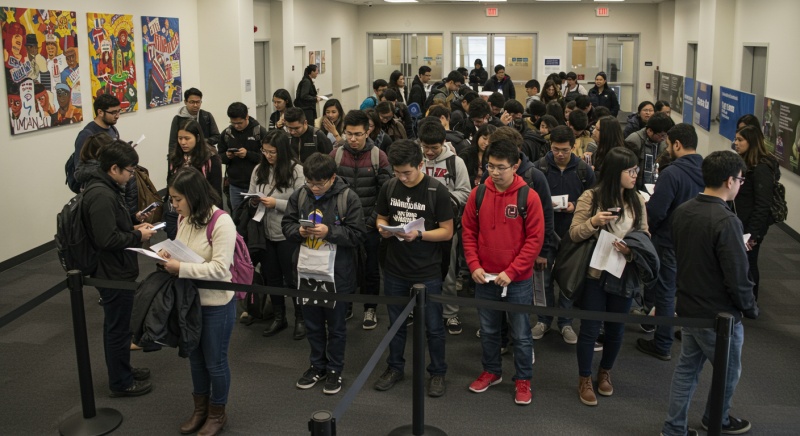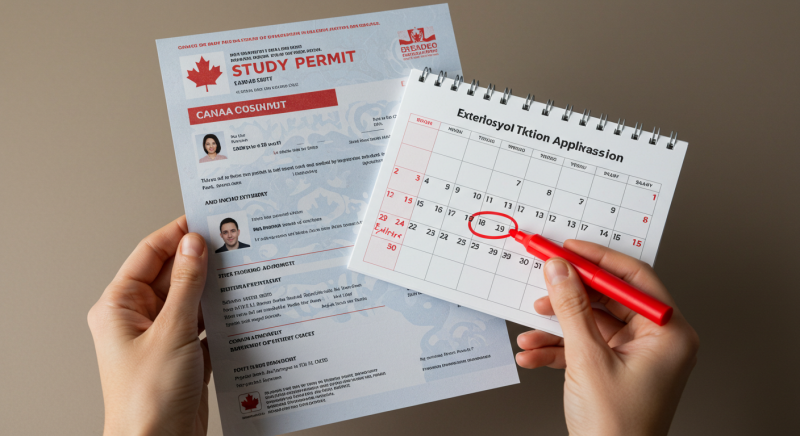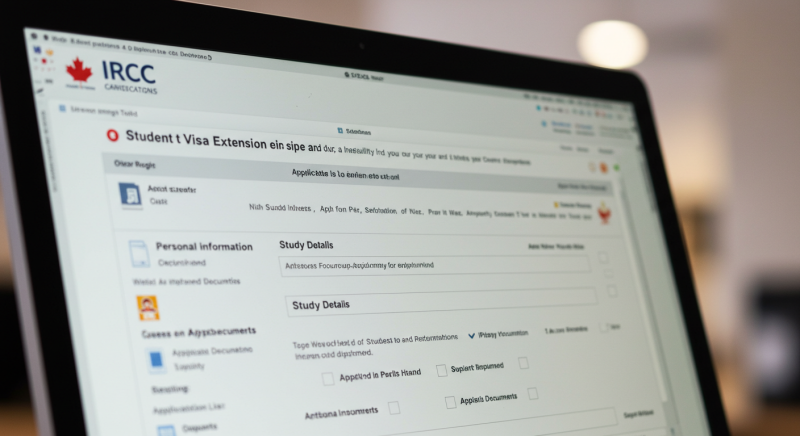You’re a Nigerian student in Canada, thriving in your academic journey, but your study permit is approaching its expiration date. The anxiety creeps in – will you be forced to abandon your dreams and return home? What if you can’t continue your education? This fear is real for thousands of Nigerian students who face the challenge of securing a student visa extension in Canada each year.
You’re not alone in this struggle. With over 43,000 Nigerian students submitting study permit applications in just the first half of 2023, the need for reliable information about visa extensions has never been more critical. The good news is that with proper preparation and understanding of the process, extending your study permit is entirely achievable.
Key Takeaways
Before we dive deep into the process, here are the essential points you need to know about student visa extension in Canada applications:
- Apply at least 60 days before your current permit expires to avoid complications
- The standard processing time is 60 days, though this can vary
- You can continue studying while your extension application is under review (implied status)
- Required documents include proof of financial support, academic transcripts, and passport validity
- The application fee is CAD $150 as of 2024
- A successful extension can serve as a stepping stone toward permanent residency

Understanding the Current Landscape for Nigerian Students
The reality for Nigerian students in Canada has evolved significantly. Nigerian international student applications to Canada increased by 260 percent, jumping from around 13,500 in 2021 to close to 46,000 in 2023. However, recent policy changes have made the process more stringent.
The approval rate for Nigerian applicants dropped from 32% to 16% in 2024, making it even more crucial to understand the student visa extension n Canada process thoroughly. Despite these challenges, Nigerian students continue to represent one of the largest international student populations in Canada.
Step 1: Determine Your Eligibility for Student Visa Extension in Canada
Before starting your student visa extension Canada application, you must ensure you meet the basic eligibility criteria. The Immigration, Refugees and Citizenship Canada (IRCC) has specific requirements that every applicant must fulfill.
You are eligible to apply for a student visa extension in Canada if you currently hold a valid study permit, are enrolled in a designated learning institution (DLI), and have been maintaining your status as a student. Your academic performance plays a crucial role – you must demonstrate that you’re making satisfactory progress in your studies.
Financial capacity remains a critical factor in your student visa extension in Canada application. You must prove that you have sufficient funds to cover tuition fees, living expenses, and return transportation. For 2024, the minimum financial requirement is approximately CAD $20,000 per year for living expenses alone, excluding tuition fees.
Your passport validity is another essential consideration. If your Nigerian passport expires within the next year, you should renew it before submitting your student visa extension in Canada application. The IRCC typically issues study permits that align with passport expiry dates.
Step 2: Gather Required Documents for Your Student Visa Extension in Canada Application
Preparing your documentation is perhaps the most critical phase of your student visa extension Canada process. Missing or incomplete documents are among the leading causes of application delays and rejections.
Your academic transcripts must be current and show consistent progress in your studies. If you’ve changed programs or institutions, include official letters explaining the change and how it aligns with your educational goals. The IRCC wants to see that your student visa extension Canada request is genuine and necessary for completing your academic objectives.
Financial documentation requires special attention. Bank statements from the past four months, scholarship letters, loan approval documents, or sponsorship letters must clearly demonstrate your ability to support yourself. Remember, the IRCC scrutinizes financial documents carefully, so ensure all information is accurate and verifiable.
Medical examinations may be required depending on your country of residence and the length of your intended stay. As a Nigerian student, you might need to undergo a medical exam if you’ve been outside Canada for more than six months or if your extension exceeds one year.
Step 3: Complete the Application Process
The student visa extension Canada application must be submitted online through the IRCC website. Creating an account and navigating the portal requires patience and attention to detail. The application form IMM 5709 is the primary document you’ll need to complete.
When filling out your student visa extension in Canada application, accuracy is paramount. Double-check all dates, especially your program completion date and the requested extension period. Any discrepancies can lead to delays or refusal of your application.
The application fee for a student visa extension Canada is CAD $150, payable online through the IRCC portal. Keep your payment receipt as proof of payment submission. Additionally, you may need to pay biometrics fees if you haven’t provided biometric information within the past 10 years.
Step 4: Submit Your Application and Track Progress
Once you’ve submitted your student visa extension Canada application, you’ll receive a confirmation email with an application number. This number is crucial for tracking your application status and communicating with IRCC if necessary.
Processing times for student visa extension Canada applications vary, but the standard timeframe is approximately 60 days. However, during peak periods or due to increased application volumes, processing may take longer. It’s advisable to apply well in advance of your permit expiry date.
While your student visa extension Canada application is being processed, you can continue studying under what’s called “implied status.” This means you can maintain your student status and continue your studies even if your permit expires, as long as you applied for the extension before the expiry date.
Step 5: Prepare for Potential Outcomes
Your student visa extension Canada application can result in three possible outcomes: approval, refusal, or a request for additional information. Understanding each scenario helps you prepare appropriate responses.
If your student visa extension Canada application is approved, you’ll receive a new study permit with an updated expiry date. Ensure you understand any conditions attached to your new permit and comply with them throughout your stay.
In case of refusal, don’t panic. You have options including applying for restoration of status within 90 days of the refusal, or in some cases, appealing the decision. Understanding the reason for refusal is crucial for determining your next steps.

Transitioning from Student Visa Extension Canada to Permanent Residency
Many Nigerian students view their student visa extension Canada as a stepping stone toward permanent residency. Canada offers several pathways for international students to transition to permanent resident status.
The Post-Graduation Work Permit (PGWP) is often the next step after completing your studies. This permit allows you to work in Canada for up to three years, depending on the length of your study program. The work experience gained during this period can significantly strengthen your permanent residency application.
The Canadian Experience Class (CEC) under the Express Entry system is particularly favorable for international students. Your Canadian education and work experience provide valuable points in the Comprehensive Ranking System (CRS), improving your chances of receiving an Invitation to Apply (ITA) for permanent residency.
Provincial Nominee Programs (PNPs) offer additional pathways for students who have studied in specific provinces. Many provinces have streams specifically designed for international graduates, making the transition from student visa extension Canada to permanent residency more achievable.
Common Mistakes to Avoid in Your Student Visa Extension Canada Application
Learning from others’ mistakes can significantly improve your chances of success. One of the most common errors is applying too late. Many students underestimate the processing time and submit their student visa extension Canada application just days before their permit expires.
Incomplete financial documentation is another frequent mistake. Ensure your bank statements clearly show sufficient funds and that all financial documents are consistent with your declared income sources. Inconsistencies raise red flags with immigration officers.
Failing to maintain academic progress is a critical error that can result in refusal. If you’ve struggled academically, provide explanations and evidence of your commitment to improvement in your student visa extension Canada application.
Understanding Recent Policy Changes
The landscape for international students in Canada has experienced significant changes recently. The Student Direct Stream (SDS) and Nigeria Student Express (NSE) programs ended on November 8, 2024, affecting how new applications are processed.
These changes don’t directly impact student visa extension Canada applications, but they reflect the government’s efforts to manage international student numbers more effectively. Understanding these broader policy shifts helps you navigate the system more effectively.
With over one million international students holding valid study permits in Canada, the competition for extensions and permanent residency has intensified. This makes thorough preparation for your student visa extension Canada application even more critical.
Financial Planning for Your Extension
Financial preparation goes beyond meeting minimum requirements. Develop a comprehensive budget that accounts for tuition increases, living cost inflation, and unexpected expenses. Many Nigerian students underestimate the total cost of their extended stay.
Consider opening a Canadian bank account if you haven’t already. This demonstrates your integration into Canadian society and makes financial transactions more convenient. Some banks offer special packages for international students that can help you manage your finances more effectively.
Explore scholarship opportunities and part-time work options to supplement your income. The 20-hour work limit for international students provides an opportunity to gain Canadian work experience while supporting your studies.
Building Your Case for Permanent Residency
While focusing on your student visa extension in Canada application, simultaneously plan for your permanent residency application. Document your Canadian experience, volunteer work, and community involvement. These activities demonstrate your commitment to Canadian society and can strengthen your future permanent residency application.
Language proficiency is crucial for both your studies and future immigration applications. Continue improving your English or French language skills, as higher language scores significantly impact your permanent residency prospects.
Network with other international students, join professional associations, and participate in community activities. These connections can provide valuable insights into the Canadian job market and immigration processes.

Conclusion
Securing a student visa extension in Canada as a Nigerian student requires careful planning, thorough preparation, and understanding of the evolving immigration landscape. While the process may seem daunting, thousands of Nigerian students successfully extend their permits each year by following the proper procedures and meeting all requirements.
Remember that your student visa extension in Canada is not just about continuing your education – it’s an investment in your future Canadian journey. Whether your goal is to complete your studies, gain work experience, or eventually become a permanent resident, success starts with a properly prepared extension application.
The key to success lies in starting early, gathering complete documentation, and understanding the requirements thoroughly. Don’t hesitate to seek professional help if you’re unsure about any aspect of the process. Your Canadian dreams are worth the effort, and with proper preparation, your student visa extension in Canada application can be the next step toward achieving them.
Frequently Asked Questions
Q: How long before my study permit expires should I apply for a student visa extension in Canada? A: You should apply at least 60 days before your current study permit expires. This allows sufficient time for processing and ensures you don’t lose your legal status in Canada.
Q: Can I continue studying while my student visa extension in Canada application is being processed? A: Yes, you can continue studying under implied status as long as you submitted your extension application before your current permit expired and you haven’t received a negative decision.
Q: What happens if my student visa extension in Canada application is refused? A: If your application is refused, you have 90 days to apply for restoration of status or leave Canada. You can also reapply if you can address the reasons for refusal.
Q: Do I need a medical exam for my student visa extension in Canada application? A: Medical exams are required in certain circumstances, such as if you’ve been outside Canada for more than six months or if your extension exceeds one year. Check the IRCC website for specific requirements.
Q: Can I work while my student visa extension Canada application is being processed? A: Yes, you can continue working under the same conditions as your original study permit while your extension application is being processed, provided you applied before your permit expired.
Q: How much does it cost to apply for a student visa extension in Canada? A: The application fee is CAD $150. You may also need to pay biometrics fees (CAD $85) if you haven’t provided biometric information within the past 10 years.
Q: Can I travel outside Canada while my student visa extension in Canada application is being processed? A: You can travel, but you may face challenges re-entering Canada. Ensure you have a valid temporary resident visa (TRV) or eTA, and carry proof of your pending application.
Q: What financial proof do I need for my student visa extension Canada application? A: You need to show proof of funds for tuition fees and living expenses. Bank statements from the past four months, scholarship letters, or sponsorship documentation are commonly accepted.
Q: Can I change my program of study while applying for a student visa extension Canada? A: Yes, but you must ensure your new program is at a designated learning institution and provide documentation explaining the change and how it aligns with your educational goals.
Q: How long is a student visa extension Canada valid for? A: The extension is typically granted for the duration needed to complete your current program plus 90 days, but it cannot exceed the validity of your passport.
Read more 10 Most Profitable Online Businesses in Australia 2025
External Source Links:
